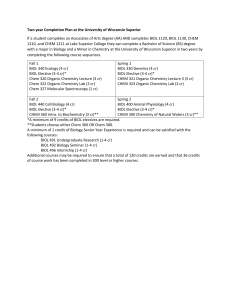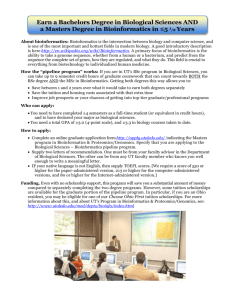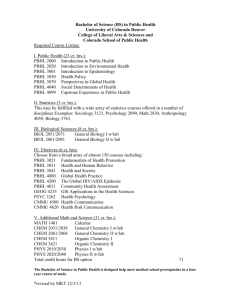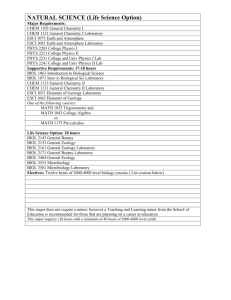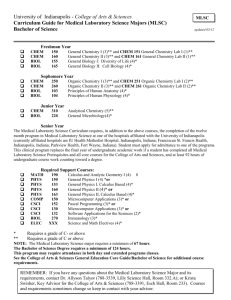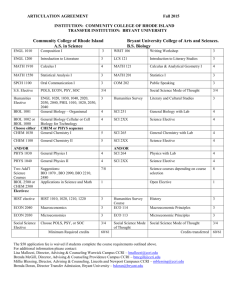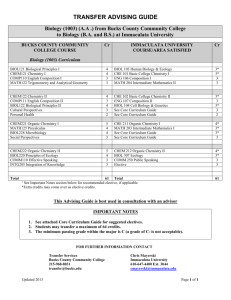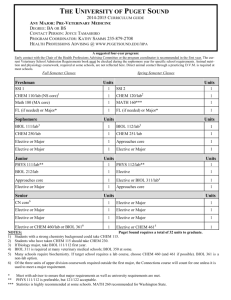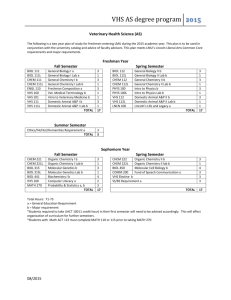About bioinformatics: Bioinformatics is the intersection between
advertisement
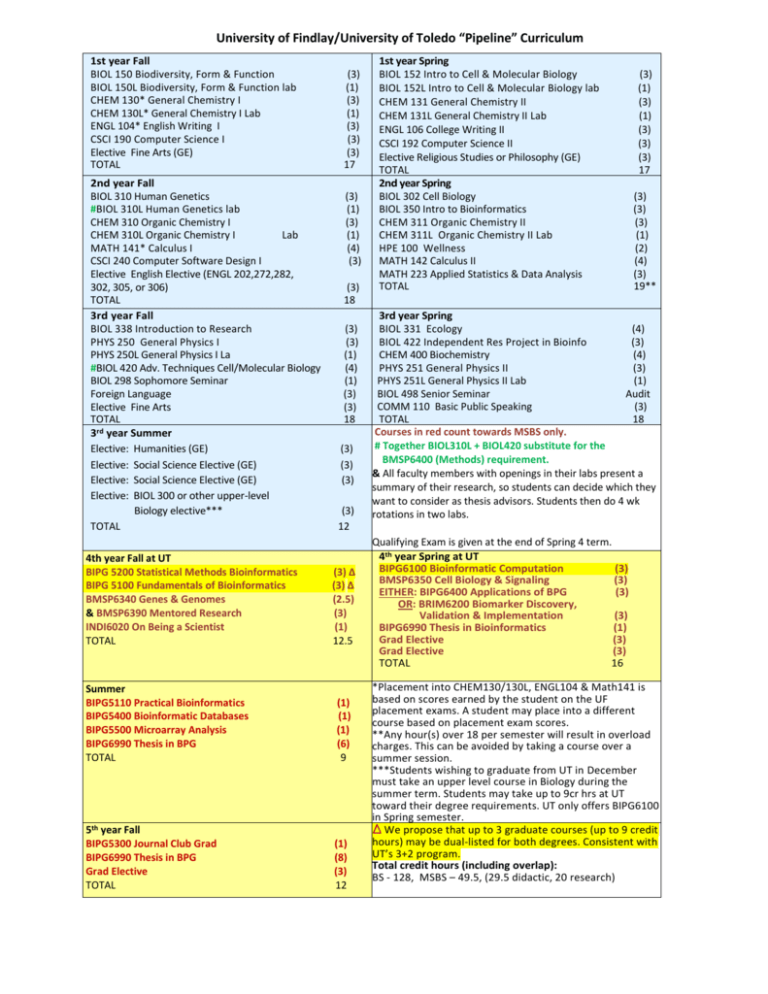
University of Findlay/University of Toledo “Pipeline” Curriculum 1st year Fall BIOL 150 Biodiversity, Form & Function BIOL 150L Biodiversity, Form & Function lab CHEM 130* General Chemistry I CHEM 130L* General Chemistry I Lab ENGL 104* English Writing I CSCI 190 Computer Science I Elective Fine Arts (GE) TOTAL 2nd year Fall BIOL 310 Human Genetics #BIOL 310L Human Genetics lab CHEM 310 Organic Chemistry I CHEM 310L Organic Chemistry I Lab MATH 141* Calculus I CSCI 240 Computer Software Design I Elective English Elective (ENGL 202,272,282, 302, 305, or 306) TOTAL 3rd year Fall BIOL 338 Introduction to Research PHYS 250 General Physics I PHYS 250L General Physics I La #BIOL 420 Adv. Techniques Cell/Molecular Biology BIOL 298 Sophomore Seminar Foreign Language Elective Fine Arts TOTAL 3rd year Summer Elective: Humanities (GE) Elective: Social Science Elective (GE) Elective: Social Science Elective (GE) Elective: BIOL 300 or other upper-level Biology elective*** TOTAL 4th year Fall at UT BIPG 5200 Statistical Methods Bioinformatics BIPG 5100 Fundamentals of Bioinformatics BMSP6340 Genes & Genomes & BMSP6390 Mentored Research INDI6020 On Being a Scientist TOTAL (3) (1) (3) (1) (3) (3) (3) 17 (3) (1) (3) (1) (4) (3) (3) 18 (3) (3) (1) (4) (1) (3) (3) 18 (3) (3) (3) (3) 12 (3) ∆ (3) ∆ (2.5) (3) (1) 12.5 Summer BIPG5110 Practical Bioinformatics BIPG5400 Bioinformatic Databases BIPG5500 Microarray Analysis BIPG6990 Thesis in BPG TOTAL (1) (1) (1) (6) 9 5th year Fall BIPG5300 Journal Club Grad BIPG6990 Thesis in BPG Grad Elective TOTAL (1) (8) (3) 12 l 1st year Spring BIOL 152 Intro to Cell & Molecular Biology BIOL 152L Intro to Cell & Molecular Biology lab CHEM 131 General Chemistry II CHEM 131L General Chemistry II Lab ENGL 106 College Writing II CSCI 192 Computer Science II Elective Religious Studies or Philosophy (GE) TOTAL 2nd year Spring BIOL 302 Cell Biology BIOL 350 Intro to Bioinformatics CHEM 311 Organic Chemistry II CHEM 311L Organic Chemistry II Lab HPE 100 Wellness MATH 142 Calculus II MATH 223 Applied Statistics & Data Analysis TOTAL (3) (1) (3) (1) (3) (3) (3) 17 (3) (3) (3) (1) (2) (4) (3) 19** 3rd year Spring BIOL 331 Ecology (4) BIOL 422 Independent Res Project in Bioinfo (3) CHEM 400 Biochemistry (4) PHYS 251 General Physics II (3) PHYS 251L General Physics II Lab (1) BIOL 498 Senior Seminar Audit COMM 110 Basic Public Speaking (3) TOTAL 18 Courses in red count towards MSBS only. # Together BIOL310L + BIOL420 substitute for the BMSP6400 (Methods) requirement. & All faculty members with openings in their labs present a summary of their research, so students can decide which they want to consider as thesis advisors. Students then do 4 wk rotations in two labs. Qualifying Exam is given at the end of Spring 4 term. 4th year Spring at UT BIPG6100 Bioinformatic Computation (3) BMSP6350 Cell Biology & Signaling (3) EITHER: BIPG6400 Applications of BPG (3) OR: BRIM6200 Biomarker Discovery, Validation & Implementation (3) BIPG6990 Thesis in Bioinformatics (1) Grad Elective (3) Grad Elective (3) TOTAL 16 *Placement into CHEM130/130L, ENGL104 & Math141 is based on scores earned by the student on the UF placement exams. A student may place into a different course based on placement exam scores. **Any hour(s) over 18 per semester will result in overload charges. This can be avoided by taking a course over a summer session. ***Students wishing to graduate from UT in December must take an upper level course in Biology during the summer term. Students may take up to 9cr hrs at UT toward their degree requirements. UT only offers BIPG6100 in Spring semester. ∆ We propose that up to 3 graduate courses (up to 9 credit hours) may be dual-listed for both degrees. Consistent with UT’s 3+2 program. Total credit hours (including overlap): BS - 128, MSBS – 49.5, (29.5 didactic, 20 research)


